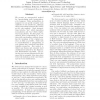Free Online Productivity Tools
i2Speak
i2Symbol
i2OCR
iTex2Img
iWeb2Print
iWeb2Shot
i2Type
iPdf2Split
iPdf2Merge
i2Bopomofo
i2Arabic
i2Style
i2Image
i2PDF
iLatex2Rtf
Sci2ools
109
click to vote
NLPRS
2001
Springer
2001
Springer
An Unsupervised Method for Canonicalization of Japanese Postpositions
We present an unsupervised method for canonicalizing joshi (postpositions) in Japanese. Some postpositions in Japanese do not specify semantic roles explicitly as case markers do, although those postpositions syntactically behave as the case markers. Such postpositions includes “wa,” which topicalizes noun phrases, and “mo,” which emphasizes noun phrases. For this paper, we replaced these postpositions in a sentence with case markers, without changing the meanings of the original sentence as little as possible. This leads to canonicalization or paraphrasing of verb phrases into canonical forms with desirable properties. Our method utilized case frames and semantic word classifications induced by the Expectation Maximization algorithm. The induction process was unsupervised in the sense that no semantic clues were given before the induction of the case frames and the word classifications.
| Added | 30 Jul 2010 |
| Updated | 30 Jul 2010 |
| Type | Conference |
| Year | 2001 |
| Where | NLPRS |
| Authors | Kentaro Torisawa |
Comments (0)

